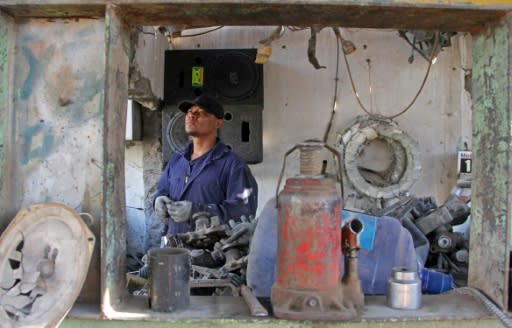US-Mexico border embrace for separated families
For three minutes, the border no longer existed for Ivan Castaneda and the family he left behind in the United States when he was deported to Mexico. They clung together in a weekend reunion for the first time since US authorities sent him back to Mexico two weeks ago as part of US President Donald Trump's migrant crackdown. Castaneda's is just one of thousands of Mexican migrant families whose lives are now disrupted by the border. On Saturday more than 300 separated families had the chance to embrace each other for three minutes under the hot sun, thanks to the "Hugs Not Walls" event organized by the Border Network for Human Rights, a US-based immigration reform group. "Every hug is an act of protest," said Fernando Garcia, the lead organizer. The fifth event of its kind saw the reunions take place at the river boundary that separates the Mexican city of Ciudad Juarez, in Chihuahua state, from the US city of El Paso, Texas. "Why don't you come with us?" Castaneda's four-year-old son asked innocently, unaware of the trauma his parents have endured since their separation began a month ago. Castaneda, 40, a former Mexican army soldier, fled to the US with his family from violence in their homeland, which registered a record 25,000 murders last year and is awash in crime linked to powerful drug cartels. "I cannot offer them anything here (in Mexico) other than suffering and death," Castaneda told AFP, referring to his family. Trump has made cracking down on undocumented migrants -- as well as toughening legal migration -- a centerpiece of his administration, while pushing for a wall to straddle the Mexico-US border in hopes of stopping the migrant flow, much of which comes from Central America. The US president has repeatedly tried to link illegal immigration to crime but immigrant defenders say many are fleeing poverty and violence. Activists accuse authorities of rounding up longtime residents with families and jobs on minor infractions. Castaneda came face-to-face with the crackdown a month ago when he opened the door of his home in Denver, Colorado to go to work on a construction job. - Fear of the cartels - Immigration agents were hiding behind his truck to detain and then deport him. Since then, he had not -- except for the three minutes on Saturday -- seen his wife and five children, aged two to 13. The reunion occurred on the edge of Chihuahua state which is turf disputed by the Juarez and Sinaloa cartels that traffic drugs to the United States, and is where Castaneda served for six years in the military. He says he got tired of the corruption, the rapes and even murder committed by military staff, even against his own colleagues. Instead of being discharged, as he requested three times, Castaneda was promoted until 2003 when he abandoned his post. The armed wing of the Juarez cartel then sought to recruit him. "I did not refuse. I said 'yes.' At the moment you cannot say 'no' because there can be reprisals. I took my family and crossed over to the United States illegally," he said. But they were all deported, and the criminals back in Mexico sought revenge. Castaneda says he then decided to seek asylum in the United States, where he worked hard for years to pay almost $15,000 to the lawyer who handled his case. But when he forgot to go to a court date, immigration agents arrested him and transferred him for 15 days to a detention center before deporting him. Now he lives in Ciudad Juarez, working in a mechanic's shop while waiting for the appeal of his deportation case. "Being alone again is not easy. I need my husband and my children need their dad," Castaneda's wife Hilda Melissa Martinez said tearfully when their brief hug had to end. Three minutes were up. The border was back. Members of a Mexican family separated by the US border embrace briefly along the frontier Mexicans separated from kin await a rare event -- Hugs Not Walls -- at which they are able to embrace on the US-Mexican border for three minutes Mexican ex-soldier Ivan Castaneda -- separated from his wife and five children -- works in an auto shop awaiting appeal of his US deportation




